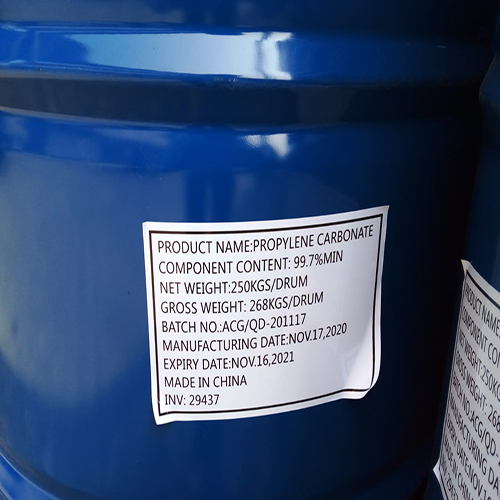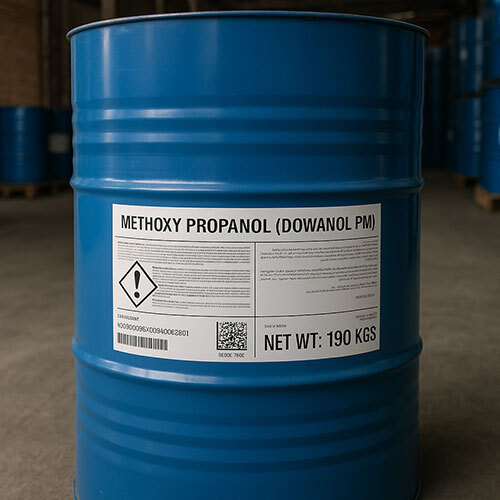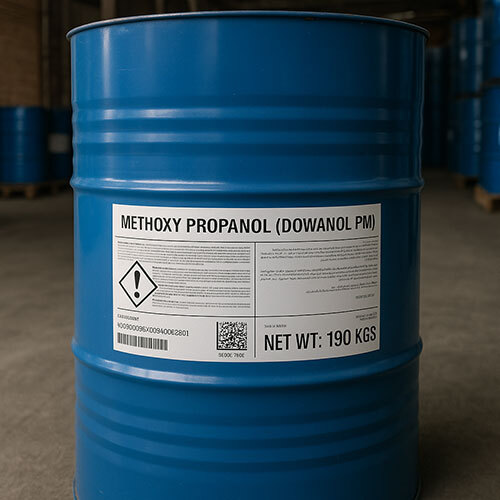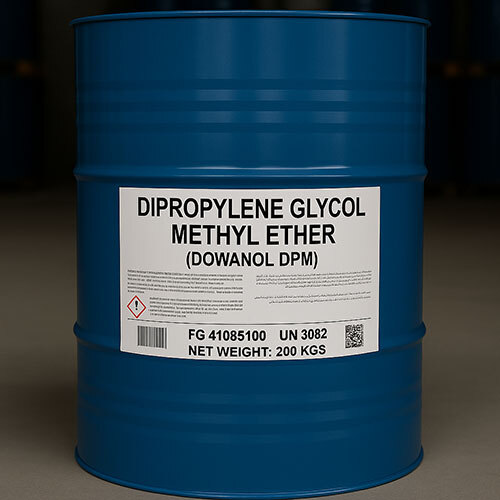पà¥à¤°à¥à¤ªà¤²à¥à¤¨ à¤à¥à¤²à¤¾à¤à¤à¥à¤² (PG)
पà¥à¤°à¥à¤ªà¤²à¥à¤¨ à¤à¥à¤²à¤¾à¤à¤à¥à¤² (PG) Specification
- घनत्व
- 1.04 ग्राम/सीएमए
- सामग्रियां
- Propylene Glycol (C H O )
- उपयोग
- प्रोपलीन ग्लाइकोल का उपयोग पॉलिएस्टर यौगिक बनाने के लिए भी किया जाता है, और समाधानों के लिए एक आधार के रूप में।
- पवित्रता
- 99%
- प्रॉपर्टीज़
- प्रोपलीन ग्लाइकोल एक प्रोपेनेसिओल है जो एक स्पष्ट, रंगहीन और हाइग्रोस्कोपिक तरल के रूप में मौजूद है और इसमें प्रोपेन होता है जहां 1 और 2 के पदों पर हाइड्रोजेन हाइड्रॉक्सिल समूहों द्वारा प्रतिस्थापित होते हैं।
- एच एस कोड
- 29053200
- घुलनशीलता
- Miscible with water and organic solvents
- प्रॉडक्ट टाइप
- Humectant / Solvent
- आण्विक सूत्र
- C3H8O2
- ग्रेड
- औद्योगिक
- विषैला
- पीएच लेवल
- Neutral
- स्टोरेज
- एप्लीकेशन
- आणविक भार
- 76.09 ग्राम/मोल
- मेल्टिंग पॉइंट
- -59 ए सी
- कैस नं
- 57-55-6
- भौतिक रूप
- दिखावट
- Clear, colorless, odorless liquid
- ईआईएनईसीएस नं
- 200-338-0
पà¥à¤°à¥à¤ªà¤²à¥à¤¨ à¤à¥à¤²à¤¾à¤à¤à¥à¤² (PG) Trade Information
- Minimum Order Quantity
- 200 Kilograms
- आपूर्ति की क्षमता
- 2000 प्रति महीने
- डिलीवरी का समय
- दिन
About पà¥à¤°à¥à¤ªà¤²à¥à¤¨ à¤à¥à¤²à¤¾à¤à¤à¥à¤² (PG)
A versatile solvent and humectant used in food, cosmetics, pharmaceuticals, and industrial applications. It enhances moisture retention, dissolves active ingredients, and is widely used in antifreeze, coatings, and personal care products.Exceptional Industrial Versatility
Propylene Glycol is renowned for its adaptability across diverse sectors. It integrates seamlessly into the chemical, pharmaceutical, and food industries, serving as a base for deicing solutions and integral component in epoxy agents, coatings, and adhesives. Its solubility and compatibility with numerous materials make it a preferred choice for industrial manufacturers seeking reliability and performance.
Superior Chemical Properties
With high chemical resistance, low viscosity, and excellent adhesion, Propylene Glycol (C3H8O2) stands out for its physical and chemical strengths. It remains stable under various conditions, boasting a melting point of -59C and a density of 1.04 g/cm. Its neutral pH and remarkable solubility properties ensure efficiency and consistency in application.
FAQs of PROPYLENE GLYCOL (PG):
Q: How is propylene glycol typically used in industrial applications?
A: Propylene Glycol is widely employed as a solvent and base material in the production of polyester compounds, deicing solutions, epoxy curing agents, coatings, adhesives, and polyurethane formulations. Its versatile nature fits numerous manufacturing processes in the chemical, food, and pharmaceutical industries.Q: What are the key benefits of using propylene glycol in manufacturing?
A: The main benefits include its high chemical resistance, excellent adhesion, good flexibility, low viscosity, and outstanding solubility with water and organic solvents. These properties enable manufacturers to create durable, reliable products across various industrial applications.Q: When should propylene glycol be used in coatings and adhesives?
A: Propylene Glycol is best utilized as a component in coatings and adhesives when enhanced chemical resistance, flexibility, and low viscosity are essential for optimal formulation and application results.Q: Where is propylene glycol typically supplied or manufactured in India?
A: Propylene Glycol is distributed, exported, imported, manufactured, and supplied by a range of industrial chemical companies across India, serving major manufacturing and processing hubs.Q: What is the process of incorporating propylene glycol into polyurethane formulations?
A: Propylene Glycol acts as a reactive diluent in polyurethane systems, improving workability, reducing viscosity for easier application, and enhancing mechanical properties such as flexibility and chemical resistance.Q: Is propylene glycol considered toxic or hazardous for industrial use?
A: No, propylene glycol is classified as non-poisonous and poses minimal health hazards when handled in accordance with industrial safety guidelines. Its high purity and neutral pH further promote safe handling.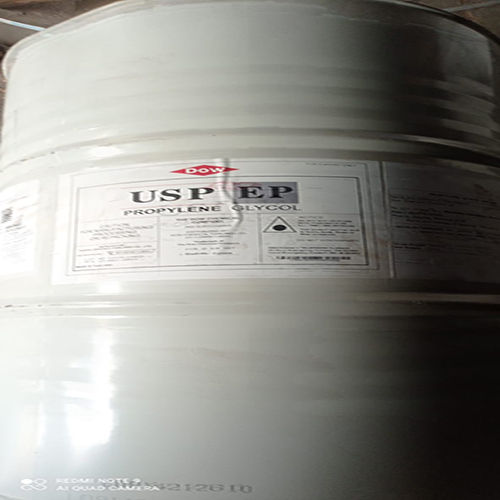

Price: Â
- 50
- 100
- 200
- 250
- 500
- 1000+
अधिक Products in ग्लाइकोल इथर और एसीटेट Category
प्रोपलीन कार्बोनेट
न्यूनतम आदेश मात्रा : 200
ग्रेड : Industrial / Technical
भौतिक रूप : Liquid
माप की इकाई : किलोग्राम/किलोग्राम
प्रॉपर्टीज़ : प्रोपलीन कार्बोनेट एक चक्रीय कार्बोनेट है जो आमतौर पर एक विलायक के रूप में और कार्बनिक संश्लेषण में एक प्रतिक्रियाशील मध्यवर्ती के रूप में उपयोग किया जाता है।
मेथॉक्सी प्रोपेनॉल (पीएम)
न्यूनतम आदेश मात्रा : 200
ग्रेड : औद्योगिक
भौतिक रूप : लिक्विड
माप की इकाई : किलोग्राम/किलोग्राम
मूल्य की इकाई : Kilograms/Kilograms
डोवानोल पीएम
न्यूनतम आदेश मात्रा : 200
ग्रेड : औद्योगिक
भौतिक रूप : लिक्विड
माप की इकाई : किलोग्राम/किलोग्राम
प्रॉपर्टीज़ : Dowanol PM व्यापक रूप से कोटिंग और सफाई अनुप्रयोगों में उपयोग किया जाता है।
मूल्य की इकाई : Kilograms/Kilograms

 जांच भेजें
जांच भेजें जांच भेजें
जांच भेजें
